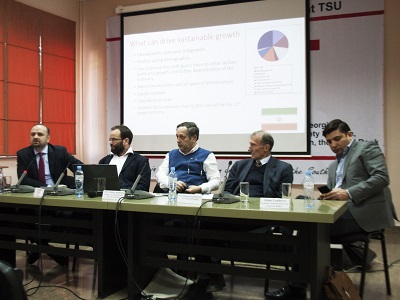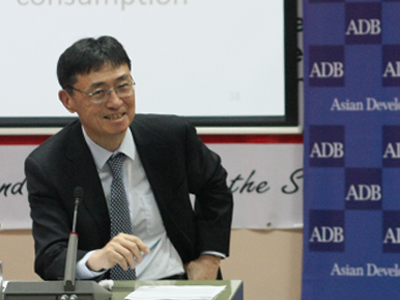The recent resetting of Georgian-Iranian bilateral relations was in the focus of a seminar organized by ISET and the Austrian Institute for Caucasus Studies as part of the Vienna Forum for the Modernization of the Black Sea Region. Held on Tuesday, March 22nd, the seminar covered both historical and current – political and economic – aspects of cooperation between the two countries. The expert panel included Professor Hans-Georg Heinrich, Austrian Institute for Caucasus Studies; Prof. George Sanikidze, Director of the Institute of Oriental Studies at Ilia State University; Iva Khokhlov, Ernst & Young-Georgia; and ISET President Eric Livny, who also moderated the discussion.
Speakers focused on the opportunities related to Georgia’s reopening towards Iran’s investment and tourism. Georgia can offer Iran several important advantages: easier access to the EU market and infrastructure connecting Iran to the Black Sea region: sea ports, rail and road, pipelines and fiber optic. Georgia should certainly expect a sharp increase in the number of Iranian tourists following the lifting of the visa requirement for Iranian visitors. Whether or not this would be followed by foreign direct investment from Iran will depend on the quality of Georgia’s business environment, its openness to qualified Iranian labor, and access to agricultural land.
On 18 April, 2016 ISET hosted Dr. Donghyun Park, a principal economist with the Asian Development Bank (ADB), who presented his team’s research: the Impact of China’s Slowdown on the World Economy. The talk was attended by ISET students and faculty, as well as representatives of Georgia’s leading businesses and business associations.
Dr. Park reviewed China’s growth over the past several decades, emphasizing the role of its very strong entrepreneurial spirit in development. He cited the example of more than 70% of top Chinese university students opting to start their own business rather than working in a large corporation, as opposed to Japanese and Korean students, who harbor much more modest entrepreneurial ambitions.
Among possible factors contributing to China’s slowdown Dr. Park listed demographics; a structural shift away from manufacturing and exports to services and domestic consumption; weaknesses in external demand; and convergence in wages. As China become less attractive for low-cost production, it has to shift to higher quality and more sophisticated manufacturing activities.
Giorgi Jvarsheishvili, Ph.D. candidate from Friedrich Schiller University Jena visited ISET this Thursday, February 9 to present his research topic on Experimental Analysis of Creativity, Cooperation and Competition to ISET students and faculty.
Mr. Jvarsheishvili started his presentation with introducing the design and the results of the experiments conducted by a number of researchers who observed effects of earning endowments on changing behaviour during trials. As findings showed, levels of cooperation within groups may depend on whether subjects were granted or have earned their endowments. This paper expands this literature by analyzing how creativity affects cooperation in Public Goods experiment. More specifically, it is explored whether effort level and effort type have affect on cooperative behaviour.













